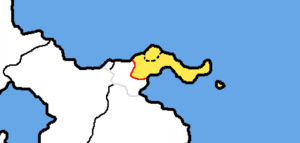First Kopen Uprising
This article is incomplete because it is pending further input from participants, or it is a work-in-progress by one author. Please comment on this article's talk page to share your input, comments and questions. Note: To contribute to this article, you may need to seek help from the author(s) of this page. |
| First Kopen Uprising Dāgobonnī Şoge Kopen | |||||||
|---|---|---|---|---|---|---|---|
 Extent of the Duchy of Jijo in the 1320s. | |||||||
| |||||||
| Belligerents | |||||||
|
(Northern Ivili, Taverkny Clan) |
| ||||||
| Commanders and leaders | |||||||
|
|
| ||||||
| Strength | |||||||
|
|
| ||||||
| Casualties and losses | |||||||
| Unknown | 7,000+ (Estimated) | ||||||
The First Kopen Uprising is a period of political unrest in Stonish history that largely plagued the Umudin peninsula. Separatist movements had spawned out of a political opposition to the crown comprised of the regions peasantry and serfs, whom had been backed and funded by the local nobility and a coalition of disturbed landlords who had suffered from that years summertime famine, having struck after a lack of centralization combined with increased wartime taxes and expectations due to the nations failures during its invasion of Hoterallia lead to the drying up of crops in agriculturally dominant regions of Flatstone. Political loyalty had remained out of the question up to this point as loyalty to the state was dictated by the Geologist faith, which was widespread in Flatstone at the time. The Kopenists were a breakaway religion with political motives seeking economic independence from the state; what made the Kopenists different from any other separatist movement was their ability to manipulate the regions population to their viewpoint. Monopolizing on the desperation of the Southern Ivili population in Umudin, many were easily persuaded by promises of peace and prosperity to be granted by the Kopenist nobles, who had attempted to frame themselves as the father figures of the peninsula. Ultimately, the rebellion would be crushed swiftly by a Southern Ivili response, however because of the dire economic situation that had swept throughout the archipelago, the religion was allowed to remain in order to maintain national integrity. The acceptance of the Kopenist faith into the nation would allow for it's gradual growth in popularity, surging most in times of peril.
Background
Jonnas Moska was a controversial figurehead at the time. He had possession over large swathes of valuable farmland passed down to him by his predecessors, providing him with an easy access to power and wealth whenever he required it. However, he had also openly denounced the Stonish war effort in Hoterallia, referring to it as having a lack of purpose. This was considered heresy by many as any invasion conducted by the nation of Flatstone was in the name of the Geologist faith in accordance with Stonish law, and so any disagreement with the state is seen as a disagreement with god. Many of Jonnas's peers had grown to distrust him, keeping their distance from the young noble out of fear of their own reputations'. Jonnas wouldn't play any important role in the political climate of the Umudin peninsula around the time of the Stonish Invasion of Hoterallia until the war started to take a toll on him directly. As the demand for food increased, so did the labor requirement. After multiple years of being overworked, many of Jonnas's properties had dried up and no longer served any purpose as a farm. He was forced to sell up to one third of his properties for less than half of what they were originally worth prior to the beginning of the war. Jonnas was devastated, and had become fed up with the state as had many of his peers. Many of Jonnas's rivals lost their hatred for the young noble, as their former disagreements had evolved into agreements, and a mutual hatred for the state as many lost access to their source of wealth lead to the formation of new alliances and coalitions against the state. Jonnas Moska was quick to gain a prominent position amidst the chaos due to his dedication to his anti-war sentiments, as well as the fact that he had protested the states actions prior to the decline of economic prosperity in the region.